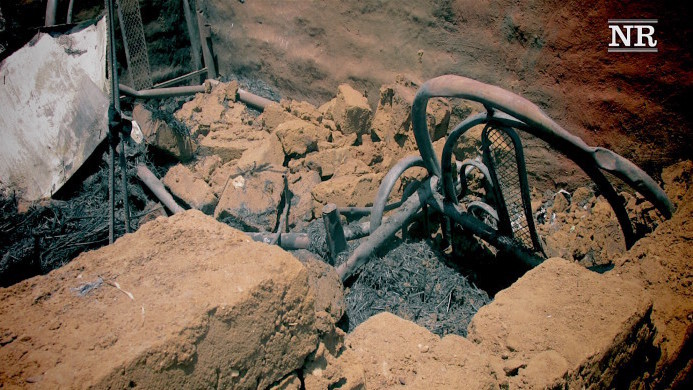Mohamed Adam was working at his job as a clerk at the governor’s office on May 31 when the awful routine sound of the government Antonov warplanes came to Kauda, Nuba Mountains.
Circling around the area around noon, an Antonov plane released 10 bombs: Four in Heiban town, two in Kumu, one in Chawde and two in Lewere village –where Adam lives. Seeing the smoke cloud hit where his family of a wife and two children resides, Adam rushed home.
“I was really scared, not only for my family but for the whole community in Lewere,” he said.
Adam’s wife, Husna Mohamed, and her two children managed to survive by taking cover in a foxhole. But the lid covering the hole caught on fire, and slightly burned the leg of their three-year-old child Munasid Mohamed. The young girl was rushed to the local hospital, one of two facilities in the entire rebel-controlled area, for treatment.
Shrapnel from the bombs also destroyed one home of his neighbor, Abdlegadir Inglese and another, Rodha Adam. Inglese was busy building a hut next to his home when the attack took place but managed to get his family to safety in time. Fortunately, Rodha and her four children also managed to stay safe by hiding in foxholes when the bombs came. But all three victims suffered heavy losses in other ways. Their homes were keeping vital supplies such as sacks of maize, salt, soap and other supplies –a ll stored to help them through the rainy season (from July to October) when roads are too muddy for travel and market goods are either unavailable or extremely expensive.
None of these victims could decipher why the Sudan government persists in bombing civilian areas during the near five-year civil war with the Sudan People’s Liberation Army-North rebels in the Nuba Mountains. It may be because the governor and deputy governor have homes in the well-protected, mountainous area of Lewere. Or it may be because Lewere is home to Lewere Hospital, run by the German Emergency Doctors organization.
Like the residents, the hospital’s field coordinator, Johannes Plate, suspects the same.
“This is the fourth time they have attempted to bomb the hospital since I’ve been here,” said Plate, who has worked in the area for two and a half years.
The small but crucial hospital has foxholes around the building and a trench to protect patients and staff during these attacks.
“One of our staff, Joseph Yacoub, was in the middle of conducting an operation when the planes flew over us,” Plate said. “There was no time to run away so he simply hid next to the operation table while his patient slept under anesthesia.”
Plate recalled their hospital had helped Munasid with her leg burns and discharged her.
Adam and his entire family have lost everything and are now residing with neighbors. He has no plans to rebuild in Lewere any time soon.
“I hope you can see they are not just bombing military targets but civilians,” he said. “In Syria, the international community responded very quickly, why not to us?” Adam questions. “Are we not human beings like them?”





